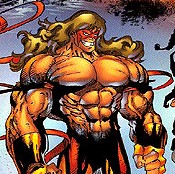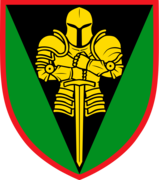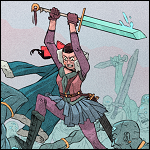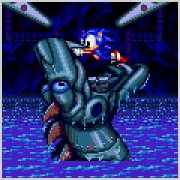|
Elysiume posted:What system is being used as the anti-D&D where you can have your character be good at fighting and high charisma and whatever else you want with no drawbacks? Is anyone actually saying this other than to set up a strawman? Nobody is saying 'good at everything ever with no drawbacks'. What they are saying is it is dumb to call someone a powergamer because they put points into making sure they are as combat capable as they can be. D&D is kinda built so that this mentality is correct and is rewarded and it doesn't really do anything to stop a player from being able to roleplay just as well as if they put points into charisma or whatever. People mention other systems because they don't have this issue per say and either have hard roleplaying mechanics in which you are mechanically rewarded and therefore encouraged to increase your roleplaying abilities or you don't have to choose been one or the other. People bring up Shadow of the Demon Lord because its a game very similar to D&D. In it there are only 4 stats: Strength, Agility, Willpower, Intellect. Will and Intellect are your two skills you can use for social conflict (plus strength for intimidate) as well as spellcasting. Will also governs your ability to resist fear and handle insanity (a somewhat big part) so the fight mans who wants to punch stuff is actively rewarded for grabbing these attributes and is therefore directly rewarded with getting a bunch of Will up. This results in someone who is a 'good player' creating a character who is able to fulfill his original character concept of 'charismatic warrior'. Where a D&D 'good player' would actively forgo the charismatic part as the system is teaching them they won't really be rewarded. This goes doubly as there isn't really much of a social conflict resolution mechanic or any sort. Mostly its just freeform roleplaying with an occasional dice role as is up to the GM's whim so its extra hard for a player to make a judgement call for what is rewarded. Now to reiterate, its fine if you like D&D this isn't about that. What its about is pointing out people optimizing by following the path the game is leading them down are not bad roleplayers or really doing anything wrong. Additionally they are just as capable and equal roleplayers as someone who doesn't go down this path.
|
|
|
|

|
| # ? May 15, 2024 13:26 |
|
Waffles Inc. posted:Yeah exactly. The bummer is when people decide that it's apparently in their RP to basically not be able to do a combat at all. I'm the player in a 5e game with some friends (Storm Kings Thunder) and we've got a Drow Sorcerer who has literally no offensive spells (apart from Ray of Frost) because she doesn't think her character would want to fight in battle. We had a Druid who also wouldn't fight, a Bard who--god bless him--basically doesn't know the mechanics of D&D, and a non-UA Ranger, who's just bad at fighting. I am very on board with 5e because it does stuff I like, but yeah just put these players into dungeon world or whatever and let them have a fun time chatting.
|
|
|
|
Yeah I think people get caught up in thinking that what people are saying is, "D&D is a bad game" instead of, "D&D is bad for any type of game/gamer who is not interested in a combat and skills mechanic game" But since a huge swath of TTRPG players don't know of any other systems, they're either willingly or unwillingly "stuck" playing D&D, so you have this whole sort of set of homebrew rules and conventions that pop up to adapt D&D into a different game that it's not. Just look at the stuff that every D&D campaign I've ever played for the last 20 years has homeruled out: - Ammunition - Weight/Encumberance - Eat/drinking - Physical spell components - Any leveling system except for milestone People spend so much time molding D&D into something that it's not JBP posted:I am very on board with 5e because it does stuff I like, but yeah just put these players into dungeon world or whatever and let them have a fun time chatting. Yeeeup, exactly what I'm doing. We're all still gonna play my friend's campaign, but I said I'll be happy to teach everyone a new game so we're starting DW up this week. I'm very excited.
|
|
|
|
A Fighter that is also wise AND intelligent AND charismatic is disingenuous all its own, but let's assume that you at least only wanted to make a Fighter that was also charismatic, even if their intelligence and wisdom is mediocre-to-low as a necessary character flaw. So you take 15 as your highest stat and put it into Strength, because you kinda need that to be an effective Fighter. And then you take 14 as your second highest stat and put it into Charisma because you want to be charismatic. Immediately this already means a trade-off, since you're not making Constitution your second-highest stat. Let's say you make yourself a Dragonborn, which bumps up your Strength to 17 and your Charisma to 15. Of the four Charisma-related skills, the Fighter class only lets you take Intimidation. Your background will let you take any two between Deception, Performance, and Persuasion, but then you couldn't have all four without spending a feat on Skilled or some other method. At level 4, you can spend your first ASI on bumping your Strength to 19. At level 6, you can spend your second ASI on bumping your Strength to 20, and your Charisma to 16 At level 8, you can spend your third ASI on bumping your Charisma to 18 At level 12, you can spend your fourth ASI on bumping your Charisma to 20 You'd have three ASIs left (14, 16, and 19), which you could spend on Constitution, or maybe feats. (and that's if the game ever gets that far) The opportunity cost here is that if you were only ever building a Fighter to fight, then you could spend the 3rd, 4th and 5th ASIs on Constitution immediately, or more feats. This would also be a Fighter that would be rather obliged to play as a melee combatant, since they wouldn't have the Dex needed to support ranged attacks, and if they did try to specialize in Dex, that would introduce even more trade-offs, since now they'd need some way to get to 13 or 15 Strength, or give up the use of heavy armor.
|
|
|
|
JBP posted:But if you go with a 13cha fighter and take the right proficiencies you're going to be ok with doing it. You're not a trained and dedicated bullshitter like a bard or a rogue but you can still be good at a few skills with standard array and proficiency. Heres one of those interesting disconnects that becomes a bit of a problem due to RAW vs RAI. So by RAW, the DCs for checks are pretty high and even grabbing proficiency and a 12 in CHA means you have a +3 bonus against a DC 15 for a medium check. Thats a pretty tough check with worse than a 50% chance for just a normal check, especially if you're running DC's with a bard sitting at CHA 16 for a solid +7 making the check pretty reliable. Remember this is a game where power is mostly a comparison to your team mates and the result, at least in my experience, is that the fighter is now only ever making these kinds of checks if they don't have the bard available. I mean yes, the GM should be trying to push your str/athletics into solving problems but that is a very narrow wind and you are banking on both the player clicking an the GM clicking on what both are trying to do which isn't always going to happen. Especially if the Fighter's personality and problem solving style simply isn't the type to be bullying and intimidating people. I played a Paladin recently in a pathfinder game who was trying to do the organised crime protection racket thing and the GM didn't understand what I was doing and cause a fight to break out between myself and some shop guards. The miscommunication between player and GM isn't something you should be depending on for it to work. Also STR governing 1 skill will always be the moment the devs should have realised how broken dnd stats are lol.
|
|
|
|
kingcom posted:Is anyone actually saying this other than to set up a strawman? Nobody is saying 'good at everything ever with no drawbacks'. also in Shadow of the Demon Lord universal moves like Help, Distract and Feint key off Intellect, Intellect and Agility respectively and can be used to give bonuses/penalties in combat that are pretty helpful. and then in Forbidden Rules they added Goad, which uses Intellect to taunt creatures and Isolate, which is just a cool new move that locks down creatures.
|
|
|
|
gradenko_2000 posted:A Fighter that is also wise AND intelligent AND charismatic is disingenuous all its own, but let's assume that you at least only wanted to make a Fighter that was also charismatic, even if their intelligence and wisdom is mediocre-to-low as a necessary character flaw. Allow me to point out that fiction is absolutely full of warriors who are paragons of martial prowess, learned, wise, and charismatic leaders of men, to the point that stupid blade-jocks are actually remarkable when they come up. These heroes have flaws, but they're largely flaws of character rather than stuff that'd show up as attribute points. The dumb fighter is a weird artifact of the D&D attribute point system. EDIT: Also, a lot of people you'd take to be the exemplars of wizards were really quite good at swordfighting.
|
|
|
|
Naelyan posted:I'm asking not to argue, but just curious what you think about people who make less than ideal combat/character building decisions for the sake of RP. For instance, a lv3 character I've made for a campaign my group is starting tomorrow is a Tome Warlock that has an insane obsession with fire. A couple of my starting spells and a couple of my extra cantrips are not ideal choices (Produce Fire, Burning Hands, Hellish Rebuke, a few others), but were chosen to fit the RP. I'm trying to tread the line between 'full out RP' and 'still being useful to the party', so I still have all the poo poo I need to have to be effective (basically eldritch blast and ritual casting), but would you see a character like that at your table as wasting time or gimping the group? Warlocks are basically EB turrets in how they function in combat, so EB+Agonizing Blast+16 CHA meets baseline competence. That's a non-issue here. Personally, there's only a few instances where people playing bad characters have bothered me: - The one time when I played a support/control Bard and somehow ended the tankiest, biggest damage dealer in a party with two Fighters, a Cleric, and a Warlock. Never again. - A dude playing a Wizard who took forever on his turns, mumbling to himself, yet ultimately being really bad at all things combat. - Same dude, making a melee Cleric with a themed list. Still garbage at combat, still taking forever on his turns, now with twice as much complaining about their inability to meaningfully contribute. *Casts Cure Wounds, then spends a solid minute wondering if there's anything else he could do* "I can't heal and attack..." "You could, with Healing Word, or Spiritual Weapon." "I'm not taking them, they don't fit my character." While I think it's bad form to play gimped characters since it puts extra strain on the DM trying to shore them up or adjust encounters for the imbalance, it's actually kinda hard to be a liability from bad numbers alone - at worst it makes you unreliable, but fellow players and the DM can adjust to that. The biggest problem with people playing bad characters is thus, their own feelings when they realize they're inadequate, and how they react if other players give them poo poo (be it IC or OOC) for being inadequate. I've played with all sorts, and honestly it doesn't bother me what people do with their numbers: what *can* bother me is the attitudes they take. Like, if I think someone is struggling with their character I'll probably give them some pointers, and if they say "no, thanks, but this is what I want to try playing" that's cool and I'll either see if I can help with that or just won't bring it up again unless prompted, but if they get offended at the implication that they could optimize their character's mechanics, I know there's going to be trouble, because these kinds of people constantly, vocally, struggle with the mechanics while refusing to accept that they might be playing the game wrong.
|
|
|
|
Waffles Inc. posted:But since a huge swath of TTRPG players don't know of any other systems, they're either willingly or unwillingly "stuck" playing D&D, so you have this whole sort of set of homebrew rules and conventions that pop up to adapt D&D into a different game that it's not. Just look at the stuff that every D&D campaign I've ever played for the last 20 years has homeruled out: Heres something I find genuinely annoying because of these things being houseruled out. There are really good ways of implementing Ammunition mechanics and Weight mechanics but because everyone instinctively ignores these rules in D&D, they instinctively ignore these in other games. Take FFG Star Wars, you have an encumbrance of 5+Brawn stat (so usually 7-9 starting), a blaster rifle is 4. So the whole point of the encumbrance mechanic is that you cant really loot and carry large numbers of guns and items, and spending 1 encumbrance to carry an extra clip of ammunition means its a real choice to carry one or not. This means that if you run out of ammo through GM spending threat/Despair, its a real pain and danger that forces the player to adapt. Star Wars characters tend to travel light with minimal gear so the rules and mechanics actively encourage you to be running like a star wars character. The amount of people who ignore these rules and then the complaint that 'running out of ammo is a trivial penalty' because extra clips of ammo are so cheap is hilariously common.
|
|
|
|
kingcom posted:Heres one of those interesting disconnects that becomes a bit of a problem due to RAW vs RAI. So by RAW, the DCs for checks are pretty high and even grabbing proficiency and a 12 in CHA means you have a +3 bonus against a DC 15 for a medium check. Thats a pretty tough check with worse than a 50% chance for just a normal check, especially if you're running DC's with a bard sitting at CHA 16 for a solid +7 making the check pretty reliable. Remember this is a game where power is mostly a comparison to your team mates and the result, at least in my experience, is that the fighter is now only ever making these kinds of checks if they don't have the bard available. I suppose this comes down to good comms like everything else, I don't have this issue when I DM. If a fighter says to me "I want to impress these townsfolk in an effort to get the mayor to give me information" I'll let him try to pick up a bench with some wenches sitting on it or whatever he thinks will get the job done. I also try to guide people so that rather than a bard rolling persuasion every time, they can think up an alternative resolution to a dispute or inquiry. Like I let the crew find out that the NPCs has personalities and likes all of their own, then see if they use it. More often than not the crew will recall that an NPC spoke at length about their love of wrestling or their time with a buff and cool adventuring fighter so the fighter can social without needing to be a face. Sure it's DM poo poo again, but if you aren't giving people stuff to do and making it fun for everyone to be in town then what's the point of even running a game? Make an important NPC smell so loving terrible that your con bonus fighter or barb are the only ones that can suffer their presence. Again it's the RAW playing of the game that comes up and I am very happy to admit 5e has poo poo you need to fudge or embellish (which is just the eternal argument about it). That's fine with me, but not fine for everyone. I also want to say this thread gave me a lot of ideas for fighter/barbarian social situations because it's such a massive gripe. A fighter should be, if inclined, completely able to win a massive crowd of people over with a broad ugly smile while they bench press the town's prize winning hog. e: with your situation if you said to me "no no, you've misunderstood" I'd be willing to step it back and understand but I get some people look at it as wasting time or have a hard and fast "bad luck, we press on" mentality.
|
|
|
|
JBP posted:I suppose this comes down to good comms like everything else, I don't have this issue when I DM. If a fighter says to me "I want to impress these townsfolk in an effort to get the mayor to give me information" I'll let him try to pick up a bench with some wenches sitting on it or whatever he thinks will get the job done. I also try to guide people so that rather than a bard rolling persuasion every time, they can think up an alternative resolution to a dispute or inquiry. Like I let the crew find out that the NPCs has personalities and likes all of their own, then see if they use it. More often than not the crew will recall that an NPC spoke at length about their love of wrestling or their time with a buff and cool adventuring fighter so the fighter can social without needing to be a face. Sure it's DM poo poo again, but if you aren't giving people stuff to do and making it fun for everyone to be in town then what's the point of even running a game? Make an important NPC smell so loving terrible that your con bonus fighter or barb are the only ones that can suffer their presence. I'm sure you are a great GM i'm not trying to call poo poo on people in particular but I follow a good rule that whenever an argument requires a GM to consistently make the good call I assume things can be done better. That amount of extra work and planning is kinda what makes 5e such a workload to run to be honest, just because of the raw amount of poo poo you need to manage for everyone to be able to participate and without a safety net. It obviously can be done but I just look at the time I spend on 5e vs any other game I'm running and its such a disparity. Interestingly what you are describing is essentially solving the issue with just more free-form roleplaying which is fine but doesn't solve it for many people. For example how do you handle a player who just isn't very good at picking up social cues or knowing to ask questions that would allow them to learn useful information about NPCs? This player can very easily be your high Charisma Fighter for example. Normally you would fall back on your social conflict mechanics to do this but since you're trying to avoid that here you're basically trying to hand hold players through conversations when their skills should be covering what the player cant do. You don't ask a player to bench press a table when you want their character to make a strength check so its always a bit odd to depend on a players social skills for the same thing. Again I'm not trying to just poo poo talk D&D but these are real problems that need solutions whether you like or don't like the game. I heard perhaps my favourite example of a problem like this that many games have and many games don't have solutions to but becomes prevalent in D&D. There is no right answer but is a good thought exercise for why there should be an answer. Say you have two characters in a dungeon and they come to a crossroad, one player wants to go left, one wants to go right. Both are convinced they know the right direction and won't compromise. How do you determine which way the party goes. Do you go left? Do you go right? Do you split the party and have to essentially run 2 games at once (this is the wrong answer cause gently caress that lol). There really isn't any way to resolve this in D&D, some systems have a way to force a decision if a player uses up a resource, some tell you not to design those kinds of splits in your adventures etc. It's a really good problem to consider. As to my hilarious situation, my GM wasn't great but thanks to the nature of DC's I genuinely didn't know if I had failed or passed my intimidation roll several session later when I was complaining about failing them all the time lol. So I had assumed this was the 'fail' result of intimidation, getting into a fight, while my GM was believing he was setting off the 'success' result of the intimidation without anyone actually saying the words. It was a weird situation that just created animosity and is all too common when you don't provide any framework for this kind of stuff imo. It's one of those moments where I feel a lot of players have run into it but brushed it off and then they've gotten into an argument with their GM weeks later or their game group falls about and nobody really knows why. kingcom fucked around with this message at 03:57 on Apr 16, 2018 |
|
|
|
Ratoslov posted:Allow me to point out that fiction is absolutely full of warriors who are paragons of martial prowess, learned, wise, and charismatic leaders of men, to the point that stupid blade-jocks are actually remarkable when they come up. These heroes have flaws, but they're largely flaws of character rather than stuff that'd show up as attribute points. The dumb fighter is a weird artifact of the D&D attribute point system. I get that - I was merely calling it disingenuous in the sense of "of course a Fighter that needs 18s in everything is unfeasible via the rules of the game"
|
|
|
|
Ratoslov posted:Allow me to point out that fiction is absolutely full of warriors who are paragons of martial prowess, learned, wise, and charismatic leaders of men, to the point that stupid blade-jocks are actually remarkable when they come up. These heroes have flaws, but they're largely flaws of character rather than stuff that'd show up as attribute points. The dumb fighter is a weird artifact of the D&D attribute point system.  Conan in life, from Dragon Magazine #36 (1980). In order to make him work they give him a grip of 18s and have his stats and class levels both rise and fall as he ages. He also gets a bunch of psionic abilities. D&D has never been about trying to replicate characters from fiction even though they're always all "Ranger: Think Robin Hood." Since day one D&D has been about creating D&D-grade fiction. Dumb fighters are definitely stupid in novels and comics, but in D&D they're the house style and they always have been, to the point where this psionic unrollable class level shifting mess is Conan. It's not an accidental artifact of D&D, it was the original intent.
|
|
|
|
theironjef posted:
Stats shifted with aging in 1e, for what thats worth.
|
|
|
|
FRINGE posted:Stats shifted with aging in 1e, for what thats worth. Sure did. And in Basic and 2nd, and even 5th, I think it's optional there: In AD&D for a human 14-20, -1 Wis, +1 Con 21-40, +1 Str, +1 Wis 41-60, -1 Str (or half the exceptional rating), +1 Int and Wis Etc. They don't line up. The guy who wrote this wasn't looking at that table.
|
|
|
|
theironjef posted:Sure did. And in Basic and 2nd, and even 5th, I think it's optional there: I don't think there is a aging effects in 5th. At least not that I could find. (But I would only include them if someones age got forcibly changed. Like when one of my players's characters got turned into a teenager.)
|
|
|
|
theironjef posted:Dumb fighters are definitely stupid in novels and comics, but in D&D they're the house style and they always have been, to the point where this psionic unrollable class level shifting mess is Conan. It's not an accidental artifact of D&D, it was the original intent. I'm not really sure if I have a particular side in this debate, but in terms of stats rather than class powers I've wondered how much of this "dumb fighters as house style" comes from how stats in earlier editions were supposed to be randomly rolled, while point buy (with the associated tendency to take points from "unnecessary" stats to focus on whatever the class needs) only became "traditional" later? Obviously no typical point-buy setup is going to let you build even level 1 (well, level 4) Conan's stats, but 6x4(-1)d6 gives you a chance of being multiply exceptional like that (and a much bigger chance of being bang average with maybe one high stat, yes).
|
|
|
|
Why does Conan have psionics? I don't remember him doing any of that poo poo in the stories...
|
|
|
|
|
TheGreatEvilKing posted:Why does Conan have psionics? I don't remember him doing any of that poo poo in the stories... Nah it was a way to make him do all the stuff a standard fighter hero in every piece of fiction does that a fighter cant do in D&D because they are so limited. Things like being able to get an animal to back off instead of attacking him meant he had to take animal telepathy cause its just not something you can reliably attempt otherwise, for him to be able to avoid magic and get the jump on people coming at him while he was sleeping etc they gave him magic cause martials cant do anything to protect themselves from it otherwise.
|
|
|
|
Dallan Invictus posted:I'm not really sure if I have a particular side in this debate, but in terms of stats rather than class powers I've wondered how much of this "dumb fighters as house style" comes from how stats in earlier editions were supposed to be randomly rolled, while point buy (with the associated tendency to take points from "unnecessary" stats to focus on whatever the class needs) only became "traditional" later? Kind of, but yes. When Elysiume asks "what system can be played where you can have a Fighter that's good at fighting AND still have high charisma AND not have it bite you in the rear end?", the answer is OD&D. Sure, you couldn't actually pick where your stats went since generation was 3d6-down-the-line, but at the same time, your stats barely mattered. An 18 in Strength didn't even give you a +1 to-hit bonus, because that poo poo only started with Greyhawk. At most, you'd get a little more XP from having a high Strength, but otherwise a Fighter with 9 Strength fought as well as one with twice that. More to your point, the problem wasn't really with the adoption of point-buy, since 4d6-assign-as-desired still meant that you'd "dump" Charisma and put your highest roll into Strength anyway, the only difference being that the lowest and highest values weren't consistent. The problem was that stats started exerting a greater and greater influence on your character's capabilities, and having high stats become more and more about needing them rather than having a "nice to have" bonus. Another example of this is the evolution of saving throws from a flat number that only grew better with character levels, into something that was derived from both a base value and an ability modifier. A TSR-era Fighter of any arbitrarily high level would be able to shrug spells like a drat champ, but "convert" him into a WOTC-era Fighter and you'll have a wimp that's going to get fear-locked into uselessness. TheGreatEvilKing posted:Why does Conan have psionics? I don't remember him doing any of that poo poo in the stories... because Conan has supernatural abilities, and you can't have supernatural abilities as a Fighter.
|
|
|
|
Dallan Invictus posted:I'm not really sure if I have a particular side in this debate, but in terms of stats rather than class powers I've wondered how much of this "dumb fighters as house style" comes from how stats in earlier editions were supposed to be randomly rolled, while point buy (with the associated tendency to take points from "unnecessary" stats to focus on whatever the class needs) only became "traditional" later? It's always been there. Sorta. During BECMI Basic character creation there are only 3 steps with choices. -You buy equipment. -You choose your class. -You exchange ability scores. Each class has a Prime Requisite score. You can adjust that up by one point for every two points you drop in another score*. You can't exchange Con or Cha points at all, you're stuck with what you rolled. You can't lower Dex (you may raise it if it's your PR). If any score is 10 or less, you can't lower it further. You can't exchange points to raise any score other than your Prime Requisite. A fighter's PR is STR, so that's the only score they can raise. They can only drop INT or WIS to raise it. INT and WIS do nothing if you're a fighter, so you're gonna drop them as hard as you can. The sorta comes in because you can't actually make a dumb fighter like this because of the restriction about lowering scores too far. At most, you can change your very smart/wise fighter to an averagely smart/wise fighter. In other words, you can't give yourself a stat penalty, those can only come from rolling. *Nearly everyone forgets everything past this point e: Oops, I hosed up. You can lower a score to 9, but only if it was originally an odd number 11 or higher. This is because it's "Your PR goes up by 1 point for every 2 points another ability goes down". You can't take a point of INT and a point of WIS and make a point of STR. Elector_Nerdlingen fucked around with this message at 08:47 on Apr 16, 2018 |
|
|
|
kingcom posted:I'm sure you are a great GM i'm not trying to call poo poo on people in particular but I follow a good rule that whenever an argument requires a GM to consistently make the good call I assume things can be done better. That amount of extra work and planning is kinda what makes 5e such a workload to run to be honest, just because of the raw amount of poo poo you need to manage for everyone to be able to participate and without a safety net. It obviously can be done but I just look at the time I spend on 5e vs any other game I'm running and its such a disparity. I agree with everything you've said. I'm not a great DM or trying to say thats what you need, I just spend loving ages working on tailoring NPCs and encounters to work for everyone. I also enjoy homebrew and modifying the game, then basically seeing things playtest out as we go (then dropping things that gently caress up or just don't really work). I can see how it would be a massive annoyance for a lot if not most people though. It also means I spend a bit more time talking to martials about how they see their character and in the main my guys like gear so I try to drop them interesting items with either a plot purpose or just some extra tools to use. I guess the main thing is that the "fighters are boring" and other conversations have made me agonise over giving martials good poo poo to do socially. I'm also trying to make a list of "physical" spells (like jump) so martials can use limited feats of strength per day since my main group are level 7. The bridge between the loving bard and wizard vs the fighter isn't exactly becoming a deep chasm as far as how exciting it is to engage in a fight, but it takes a bit of effort to make it better than "I hit the monster, I use my hit the monster again power, I end my turn".
|
|
|
|
Elysiume posted:What system is being used as the anti-D&D where you can have your character be good at fighting and high charisma and whatever else you want with no drawbacks? The Gate posted:People see helpless/lovely characters in books and like them, and those just don't tend to translate well to tabletop, It also allows for the opposite, the strawman all 18s fighter. You trade in all your narrative points for extra ability scores making you a god amongst men mechanically, with the weakness of being completely subject to the whims of the dice and a prime target for the GM's own narrative currency.
|
|
|
|
Splicer posted:Sticking your fingers in your ears and declaring everything fine and no it's an inviolable rule of nature that being able to read people's intentions and influence their actions is of no utility to someone who's made a career out of putting swords into people, not so much. I'm not really seeing how these other systems offer an option other than specialization leading to drawbacks (a fighter can't smoothtalk, a wizard can't bench press) or no specialization leading to homogeneity in capabilities. I've read the SotDL book (and haven't played it), and it seems far less specialization based in terms of what would be the stat/skill equivalent of 5e. A befriend roll is will vs. will, and most characters will have at least a few points in will for the reasons mentioned upthread. The end result looks to be that nobody excels at befriending people, because many characters will have similar scores. For a character to have a meaningful degree of talent at something, there needs to be a sacrifice made for it. Maybe people just have more RP-heavy groups where players will just avoid making a befriend/diplomacy/whatever check, but at the end of the day, if the schmoozy bard and the surly, willful mercenary are both getting +4 on befriend checks, it feels weird to me. Is it the cutoff that D&D forces you to overspecialize due to the DAD/MAD nature of many classes, leaving very little to put into optional, fluffier stats/skills? That more MAD classes have less to put into secondary and tertiary skills, because they spend their limited resources on the core parts of their class? Elysiume fucked around with this message at 09:41 on Apr 16, 2018 |
|
|
|
Elysiume posted:Is it the cutoff that D&D forces you to overspecialize due to the DAD/MAD nature of many classes, leaving very little to put into optional, fluffier stats/skills? That more MAD classes have less to put into secondary and tertiary skills, because they spend their limited resources on the core parts of their class? Yes, and yes. A MAD class has less room in their persona to have non-combat abilities/competencies, and even across the same class, you're still always making combat-vs-non-combat trade-offs because the selections are not silo'd properly (as in, all feats competing against all other feats)
|
|
|
|
gradenko_2000 posted:Yes, and yes. Elysiume posted:This is frustrating in so many editions. You can take a fun, flavorful feat that bolsters your character's personality, or a boring feat every other paladin/cleric/fighter has because you need it to be good at killing things. Sure, people always have the option to throw charop away and just build a cool, unique, evocative character, but then they need to deal with being outclassed by the rest of the party. Elysiume posted:I'd almost prefer having separate power and flavor feat tracks. "Speak with burrowing animals as spell-like ability" isn't competitive with "no penalty for shooting into melee" except under contrived circumstances (especially since it has, as a prereq, the once per day Speak with Animals that gnomes have).
|
|
|
|
TheGreatEvilKing posted:Why does Conan have psionics? I don't remember him doing any of that poo poo in the stories... Thats also why so many of the more dangerous monsters had a spell-like ability list (counted as magic) as well as a psionic list (not quite magic). Mostly unrelated: There was also the thing that having psionics at all made you a part of psionic battles, which was a whole new way to die that non-psionic characters didnt have to even think (ha) about. So suddenly the potential for early death when facing demons/devils/illithids skyrocketed for those characters. Someone transcribed and clarified the giant complicated mess from the early stuff here: http://home.earthlink.net/~duanevp/dnd/psionics.htm I know later on WotC basically said "magic and psionics are the same and can be dispelled by dispel magic", but I dont remember how it was before. Anyone know off hand? In-house we treated the very occasional psionic monster as "not casting spells" and didnt allow various anti-magic to stop it. - edit - well at least in 2e anti-magic did not effect psionics, they had an example spell-vs-psionic list in the Complete Handbook
|
|
|
|
Elysiume posted:Now you're just putting words in my mouth (and fingers in my ears). I don't like the 5e skill system, and in fact dislike it more than the PF system, which I'm still not a particular fan of. I don't like that combat and fluff options pull from the same resource pool, and that putting skill points into profession (woodwork) means that you're sacrificing points that could've gone into acrobatics to avoid AoOs. So if you choose to be a burly punchman who's also stealthy, that's a good choice. If you choose to be a burly punchman who's bad at dex but good at charisma then you're trading your out of combat strengths and weaknesses for a roughly equivalent set of out of combat strengths and weakness, which is good! But you're also trading one set of combat strengths for absolutely nothing. Which is bad. Rewarding specialisation is a perfectly fine design goal for an RPG. The D&D ability score layout however artificially penalises certain perfectly thematic specialisations over others for no good gameplay reason. So you can look at this and think "man it's kind of balls that someone wanting to play a burly, charming, but kind of oblivious fighter dudette is going to be less effective than if they'd gone burly and wise, how can we fix this", or you can say "dumb limitation of the system, what can you do", or you can say "no it's good that str cha dex con int wis is worse than str wis con dex cha int, I mean obviously". Either of the first two are fine.
|
|
|
|
My impression is that d&d is especially hampered by having about half of its design decisions being made to 'feel like d&d' rather than to achieve any sort of goal. Three huge tomes are just how d&d games are presented, so we'd best have enough rules to fill those books, etc.
|
|
|
|
|
lofi posted:My impression is that d&d is especially hampered by having about half of its design decisions being made to 'feel like d&d' rather than to achieve any sort of goal. Three huge tomes are just how d&d games are presented, so we'd best have enough rules to fill those books, etc. Theres no lack of rules available from DnD gone by, the trick is which ones to move forward. If anything they should have cut some 3e classes/spells from the initial books and given more detailed stuff on movement, time, order, initiative, weather, and other environmental/scene/timing things that keep games running coherently. They could have tossed Sorcerer, Warlock, Barbarian, and whatever in an official full sized Unearthed Arcana 5th Edition (or whatever name, I was thinking of the 1e intro of the Barbarian the first time) with all the extra subclasses they cooked up, the new and expanded spell lists, items, whatever, and had a more complete set of rules in the initial ones. Like combing Dungeoneers Survival Guide (1e), Wilderness Survival Guide (1e), and the storm/sand/ice (3e) books and adding more (of the non-crazy) environment and travel rules to the DMG. Adding more narrative "how to play" mini stories to the PHB. Organizing the loving spell lists maybe. Im tired and theorycrafting dnd books is less stressful than thinking about work.
|
|
|
|
FRINGE posted:
Warning, it's an internet video, but "Exploding Head Syndrome" by that Spoony guy goes into it pretty well, including instantly losing if you don't have powers, the low roll %, etc. It's a pretty good video even if you didn't like his other content.
|
|
|
|
FRINGE posted:Theres no lack of rules available from DnD gone by, the trick is which ones to move forward. If anything they should have cut some 3e classes/spells from the initial books and given more detailed stuff on movement, time, order, initiative, weather, and other environmental/scene/timing things that keep games running coherently. They could have tossed Sorcerer, Warlock, Barbarian, and whatever in an official full sized Unearthed Arcana 5th Edition (or whatever name, I was thinking of the 1e intro of the Barbarian the first time) with all the extra subclasses they cooked up, the new and expanded spell lists, items, whatever, and had a more complete set of rules in the initial ones. Like combing Dungeoneers Survival Guide (1e), Wilderness Survival Guide (1e), and the storm/sand/ice (3e) books and adding more (of the non-crazy) environment and travel rules to the DMG. Adding more narrative "how to play" mini stories to the PHB. Organizing the loving spell lists maybe. So cutting out some of the base classes to put more time and effort into fleshing out the ones that are included. Where have we seen this before . . .
|
|
|
|
It's pretty funny that effectively every change wotc made to tsr's giant unwieldy mess has actually blown up in their faces due to unforeseen consequences. and somehow it keeps getting worse
|
|
|
|
I know no one in this thread is a WOTC D&D game designer, but some decisions are just so weird. Like, why doesn't Initiative key off of your "class" stat? There's no reason it needs to be DEX for everyone. Why can't a fighter's initiative be keyed to STR? Or why not be able to choose, on creation, which stat you want your initiative keyed to?
|
|
|
|
Waffles Inc. posted:I know no one in this thread is a WOTC D&D game designer, but some decisions are just so weird.
|
|
|
FRINGE posted:Theres no lack of rules available from DnD gone by, the trick is which ones to move forward Not quite what I meant - I meant that I think the basic assumption that a game needs that many rules is false. Three oversized books is a crazy amount of detail, even if you assume only 1/6 is actual rules. But because of tradition, D&D always comes in three books. That has its own knockon consequences, such as monsters needing to have complex stats (to justify their own book), and so much of D&D feels like it's the result of that sort of rear end-backwards thinking. I guess it's a pointless argument, to 'fix' D&D you'd have to change so many core aspects that it wouldn't be D&D anymore. Kill ability scores, kill d20s for resolution, kill magicians-can-do-anything fighters-must-be-realistic.
|
|
|
|
|
lofi posted:I guess it's a pointless argument, to 'fix' D&D you'd have to change so many core aspects that it wouldn't be D&D anymore. Kill ability scores, kill d20s for resolution, kill magicians-can-do-anything fighters-must-be-realistic. It's an interesting thought experiment: what can you change/kill from D&D and still keep its "DND-ness"?
|
|
|
|
Waffles Inc. posted:It's an interesting thought experiment: what can you change/kill from D&D and still keep its "DND-ness"? It's a trick question. D&D has only ever been about emulating itself as a theme since at least 3rd Edition. There are games that do "fantasy" well, and even games that do "dungeon hack-and-slash" well, but D&D is, by now, a genre of its own make and model.
|
|
|
|
Vent post about lovely group members: We're a group of seven newbies who have been playing for several months now and yesterday really pissed me and the DM off to the point where it was making the game hard to enjoy. Out of the six of us players: two were on their laptops the entire time, not engaging at all and only looking up to make their attack turns ("what's going on? Where am I?"). One was on his phone the entire session sending memes to the group chat and constantly interrupting the flow. One still doesn't know what his spells do after 30+ hours of play and has to ask the DM every turn "what does X spell do?", which slows combat to a crawl (the DM is starting to get snappy and visibly annoyed at this). It seriously takes us hours to do what should take like 30 minutes. One of the laptop players just started playing Disney songs towards the end of the session. The session effectively turned into just me interacting and roleplaying with the DM and trying to progress the story on behalf of the group. I feel bad for the DM and wouldn't be surprised if he chucks the whole thing in, which would suck because it's really the only chance I get to play.
|
|
|
|

|
| # ? May 15, 2024 13:26 |
|
Waffles Inc. posted:It's an interesting thought experiment: what can you change/kill from D&D and still keep its "DND-ness"? At this point the only thing that's uniquely d&D is their presumably copyrighted monsters, i.e. beholders, illithids, rust monsters, and maybe drow. And I've never even seen (or heard about in a campaign) the former two
|
|
|

































